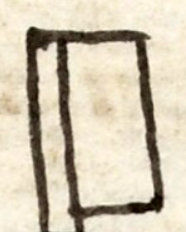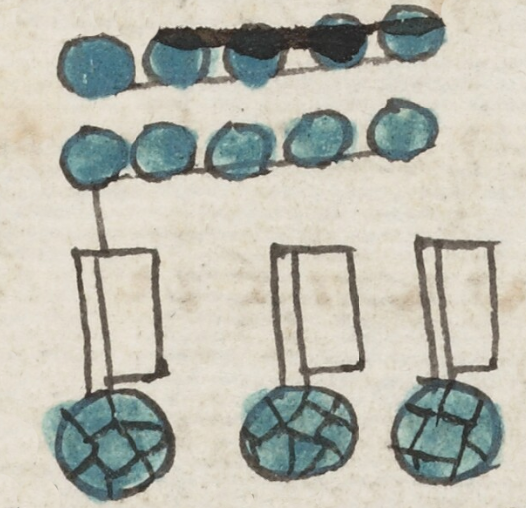tecpantli (Mdz71r)
This iconographic example of tecpantli (twenty) is intended to provide a comparison to flags and banners in the glyphs, particularly for banners that stand for the number 20 (tecpantli) versus flags that are meant to be flag and flags that provide the phonetic locative suffix -pan of place names. This flag is upright, facing to the right. The banner is white, as is the pole.
Stephanie Wood
The gloss is best considered in light of the contextualizing image, for it tells us that the compound notation stands for 70. This means each flag counts twenty years, as three times 20 is 60, and another ten ones (above), come to 70. It is a challenge to differentiate between the panitl (or pamitl), pantli, and tecpantli, for they look very much alike most of the time. For now, when the banner has an association with a number, we are using pantli, and when it is a locative for a place name, we are using panitl. Apparently panitl was more common in "Mexico, the Tepanec heartland, and perhaps Colhuacan and Chalco," and pamitl in "northern and eastern flanks of the Valley of Mexico." See: Jorge Klor de Alva, in The Work of Bernardino de Sahagún: Pioneer Ethnographer of Sixteenth-century Aztec Mexico (Albany, NY: Institute for Mesoamerican Studies, the University at Albany, State University of New York, 1988), 323.
Stephanie Wood
setenta
setenta
Stephanie Wood
c. 1541, or by 1553 at the latest
flags, banners, panitl, pamitl, 20s, twenties, banderas, veintes, twenty, 20, numbers, números, cempohualli, xiuhpohualli, año, turquesa, xihuitl

-tecpan(tli), a visual notation for the number 20, referring to furrows, agaves, people, etc., https://nahuatl.wired-humanities.org/content/tecpantli
pan(itl), flag or banner, https://nahuatl.wired-humanities.org/content/panitl
cuachpami(tl), a standard, a flag, or a banner, probably made of cloth, https://nahuatl.wired-humanities.org/content/cuachpamitl
pam(itl), flag or banner, https://nahuatl.wired-humanities.org/content/pamitl
pan(tli), furrow or agricultural row, https://nahuatl.wired-humanities.org/content/pantli
-tecpantli, twenty, https://nahuatl.wired-humanities.org/content/tecpantli
centecpan(tli), one group of twenty, https://nahuatl.wired-humanities.org/content/centecpantli
la bandera, el número 20
Stephanie Wood
Codex Mendoza, folio 71 recto, https://digital.bodleian.ox.ac.uk/objects/2fea788e-2aa2-4f08-b6d9-648c00..., image 152 of 188.
Original manuscript is held by the Bodleian Libraries, University of Oxford, MS. Arch. Selden. A. 1; used here with the UK Creative Commons, “Attribution-NonCommercial-ShareAlike 3.0 License” (CC-BY-NC-SA 3.0)



